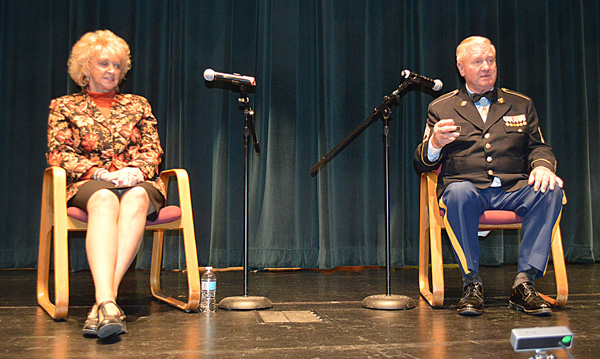
The Medal of Honor recipient that is sometimes referred to as “the real Forrest Gump,” Army Ret. Sgt. 1st Class Sammy Davis, spoke at Warsaw Community High School Performing Arts Center Thursday.
Members of the high school’s JROTC, Notre Dame ROTC and American Legion Post attended the talk. The speech was livestreamed to classrooms at the high school. A video was shown before the speech, introducing Davis’ military history that led him to be awarded the Medal of Honor.
WCHS Principal Troy Akers said Davis grew up in Dayton, Ohio, and is “a transplant Hoosier.”
In 1965, Davis enlisted in the Army. According to the video, Davis’ father had been an artilleryman in World War II and Davis volunteered to do the same. Upon completion of training, he requested to be sent to Vietnam.
“Our job was to provide close and continuous support to the infantry. That’s the artilleryman job,” Davis said in the video. “So we would sometimes have to fire almost continuously for eight or 10 hours. As long as the enemy was attacking our infantry, you’d have to do your job. Then we’d wait around for a day or two days and not do much.”
In the video, Davis described his 27-year-old sergeant during the war as a “bitter old man” and a “bitter old sergeant” who constantly picked on his men.
On Nov. 18, 1967, Davis’ unit was airlifted to an island near Cai Lay. Infantrymen were already engaged when Davis’ men arrived.
During the video, Davis described the attack that ensued, including hearing the Viet Cong shouting orders in English, saying, “Go kill the G.I.”
During the attack, someone shouted at Davis, stating the man he was about to shoot at was a G.I. Davis knew the man needed help, so he rode an air mattress across a river. When he made it across the river, there were actually three men in a fox hole that needed help across the river. Davis made two trips across the river, bringing the three injured soliders across it.
At one point, Davis came across his sergeant who had been injured. Davis said his sergeant put out his hand toward him and he took it.
During his speech Thursday, Davis said that the only thing he felt at that time was love. He knew his sergeant loved him and his men and Davis knew he loved his sergeant. Davis’ sergeant survived and Davis was able to spend time with his grandchildren.
Besides winning the Medal of Honor, Davis said his biggest accomplishment is “figuring out what brotherhood, sisterhood is. That is one of the things that we learned in the military and sometimes the media gets carried away. It’s not the color of your skin that’s important, it’s what’s in your heart. And in the military, that’s one of the things that the military taught me was what’s in your heart that counts, not the color of skin,” Davis said. “Two of the men I swam across the river for were Black.”
He said you’d do for your brothers what they’d do for you.
On Nov. 19, 1968, Davis received the Medal of Honor from President Lyndon Johnson.
When asked what it felt like to have the president salute him, Davis said it was “awesome.”
Davis said the scene in “Forrest Gump” where the title character was awarded the Medal of Honor was actually footage of him that was repurposed for the film.
When Johnson was putting the Medal of Honor around Davis’ neck, Davis said he was “really, really frightened.” He didn’t know what to expect.
“… I was so honored and so scared,” Davis said.
When he first got the medal, he said it wasn’t too heavy, but he got in 1968.
“I can tell you it does get heavy, because it doesn’t belong to me. It belongs to you, so I have to wear this every day how I would think you would wear it. And that could get heavy because I love and respect you all,” Davis said.
Davis even said LBJ talked to him and four other Medal of Honor recipients that day before the ceremony. LBJ said he had a small ranch just outside of where Davis was stationed at the time. LBJ pulled out a card and gave it to Davis and told him to “come see me whenever you want to.”
He visited the ranch three or four times. LBJ was not there but Lady Bird Johnson was.
Dixie, Davis’ wife, said Davis just went down there “to meet the daughters.”
Davis said he’s “had the privilege of going to almost every country in the world.” Wherever “there’s military, I’ve been because the military takes me in.”
Davis said he went back to Vietnam in 2016 and visited every place he was stationed at. He visited with Dixie and the three men he rescued.
He said the cuisine in Vietnam has pretty much stayed the same as when he was stationed there in the ‘60s.
“We ate with the locals all the time and I had no clue what I was eating,” Dixie said.
Davis said they ate a lot of ducks since there’s a lot of swamps in Vietnam and ducks can be raised there. There’s a lot of snakes, too.
A Vietnamese solider on the American side once asked Davis if he wanted a bit of an anaconda that he was roasting over C-4. “And I’m thinking, I’m hungry, but I’m not that hungry,” he said. He ended up eating it and said, “I love anaconda.”
Dixie also spoke about the differences between the U.S. and Vietnam.
At one point, Dixie was on a tour bus in Ho Chi Minh City.
“It did not take long to take a picture,” Dixie said, due to the smell. “We’re used to all the conveniences here in America.”
There is no refrigeration, so people would have to go buy food every day for what they needed.
“We’re really privileged here, and I lot of times, I think we don’t realize how privileged we are because we haven’t been anywhere else,” Dixie said.
Davis said one of the unique things of being in the military is going to other places. Growing up, he said he thought he was poor, but he always had food.
“Travelling around the world, I’ve had the privilege. We’re not poor, we’re rich,” Davis said. “Too many people truly don’t have enough to eat.”




